 Petzlover
Petzlover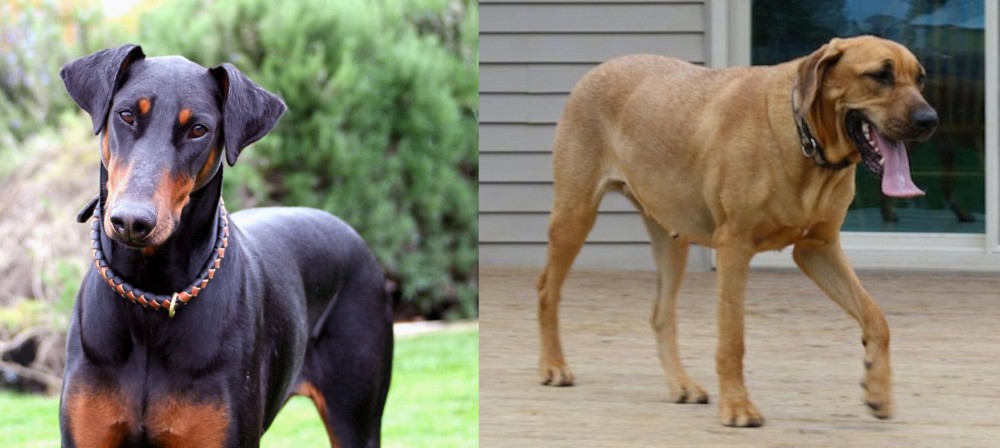 Doberman Pinscher is originated from Germany but Danish Broholmer is originated from Denmark. Both Doberman Pinscher and Danish Broholmer are having almost same height. Doberman Pinscher may weigh 15 kg / 33 pounds lesser than Danish Broholmer. Both Doberman Pinscher and Danish Broholmer has almost same life span. Both Doberman Pinscher and Danish Broholmer has same litter size. Doberman Pinscher requires Low Maintenance. But Danish Broholmer requires Moderate Maintenance
Doberman Pinscher is originated from Germany but Danish Broholmer is originated from Denmark. Both Doberman Pinscher and Danish Broholmer are having almost same height. Doberman Pinscher may weigh 15 kg / 33 pounds lesser than Danish Broholmer. Both Doberman Pinscher and Danish Broholmer has almost same life span. Both Doberman Pinscher and Danish Broholmer has same litter size. Doberman Pinscher requires Low Maintenance. But Danish Broholmer requires Moderate Maintenance
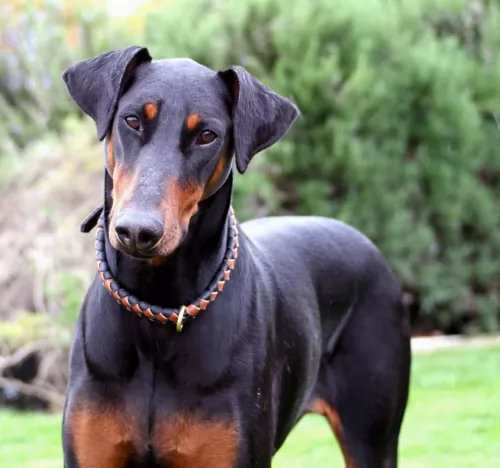 The origin of Doberman is Apolda, in Germany in 1890. It was officially recognized as a breed in 1900. The name originally called as Thuringer pinscher or Plizeilichi and the peer was renamed as DOBERMAN PINSCHER in 1899.American Kennel Club recognized DOBERMAN PINSCHER in 1908. The German tax collector called Karl friedrich developed Doberman.
The origin of Doberman is Apolda, in Germany in 1890. It was officially recognized as a breed in 1900. The name originally called as Thuringer pinscher or Plizeilichi and the peer was renamed as DOBERMAN PINSCHER in 1899.American Kennel Club recognized DOBERMAN PINSCHER in 1908. The German tax collector called Karl friedrich developed Doberman.
He developed a breed that would be able to protect him from his surroundings and from his neighborhoods. This Dober also ran as a local animal shelter and approch many dogs for his breeding program. But karl did not kept any proper records or document for this breeds origin. Dobeis are also found through United States, Russia and South Africa.
 The Danish Broholmer is also known as the Danish Mastiff. This is a large dog which comes from Denmark.
The Danish Broholmer is also known as the Danish Mastiff. This is a large dog which comes from Denmark.
Known as a molosser breed, the dog used to fulfill a guard dog role in the home of wealthy Danish people. There are those who take one look at the dog’s size and build, and regard him as aggressive, when in fact he is a calm, good-tempered dog.
The origin of this large dog breed goes way back to the Middle Ages, although details of the dog’s origins are unknown. The Broholmer comes from mixing the English Mastiff and various local German breeds, being named after the Sehested of Broholm.
The dog all but became extinct during the Second World War. It was in 1974 that the Danish Kennel Club started looking to revive the breed. The breed was revived and the dog was imported to the United Kingdom in 2009. The Danish Broholmer has been recognized by the United Kennel Club in 2006.
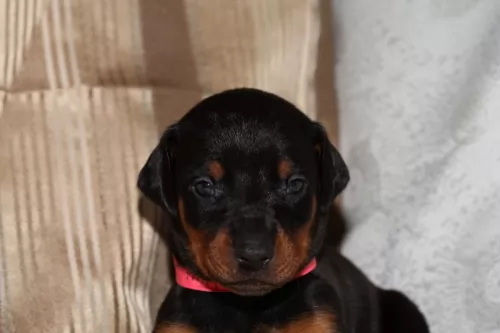 Dobermans are certainly shorthaired mixed –breed shepherd dogs, this kind of dogs are chosen only for their intelligent, sound and endure. This breed is best in attitude and appearance, and now it is found in world wide. Dobermans are highly intelligent and fast runners. So mostly dobers are only suited for Police, Army and Guard works. Dobies are also used as guide dogs for the blind.
Dobermans are certainly shorthaired mixed –breed shepherd dogs, this kind of dogs are chosen only for their intelligent, sound and endure. This breed is best in attitude and appearance, and now it is found in world wide. Dobermans are highly intelligent and fast runners. So mostly dobers are only suited for Police, Army and Guard works. Dobies are also used as guide dogs for the blind.
They are very elegant in appearance. Dobies are watchful, determined, energetic, fearless, obedient, alert and loyal. Dobies are short coat so it is easy for care. Brushing regularly can avoid shedding at home. They have almond shaped eyes, they have long narrow heads. The Doberman ears are often cropped but many of the owners like dobers by their nature. Dobers looking was always like a graceful giant.
 The Danish Broholmer is a large dog that looks familiar to the Mastiff. The dog stands roughly between 66 and 75cm and weighs between 40 and 60kg.
The Danish Broholmer is a large dog that looks familiar to the Mastiff. The dog stands roughly between 66 and 75cm and weighs between 40 and 60kg.
The body is strong and muscular and he has the large head of the molosser. The coat of the dog is short and harsh, with the color being fawn, light brown, yellowish or black. He is quite a heavy shedder and will require brushing twice a week.
The dog usually has a black mask.The muzzle is also large, the nose black. His ears are medium-sized, set high and floppy, the chest deep. The tail is long and carried downwards.
The Danish Broholmer is an awesome family pet who seems to go out of his way to please his human family. He is an intelligent dog and obedient by nature. Because he is so devoted to his human family, he wants to protect them too.
He is a non-aggressive dog and the best part about owning such a dog is that he is a gentle pet for the family but he still looks threatening to intruders.
The Danish Broholmer gets on well with children and pets in the home. However such a big dog needs to be trained and socialized and he could jump up against smaller people and unintentionally send them flying. Training will see to it that he responds well do simple commands such as ‘down’, ‘sit’, lie-down’ and ‘come’.
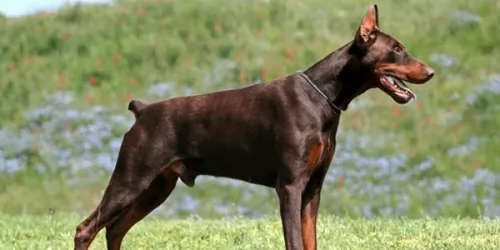 Dobermans are individual in personalities. Some dogs are friendly and outgoing; some Dobies are reserved and shy. Some will be more dominant with other dogs it used to chase small dogs and cats. Most of the dobers are soft in character and love companionship with people.
Dobermans are individual in personalities. Some dogs are friendly and outgoing; some Dobies are reserved and shy. Some will be more dominant with other dogs it used to chase small dogs and cats. Most of the dobers are soft in character and love companionship with people.
Dobers have high energy level and it requires a lot of exercise in order to avoid harmful behavior to others. We should keep them interested because intelligent dogs are easily got bored. They mostly enjoys only in outing because they will be happy with the people who walks, runs and in bike riding.
When learning new things they are the best. Dobermans are not able to be a lazy. For many years dobers are the only dogs being excellent as police dogs. Because they are highly active in nature so they are interested in new this for learning.
Dobers are apartment adaptable dogs. They used to bark but are close and friendly to people. At the same time we have to train dobers to welcome the guest also.
 Once people have owned a Danish Broholmer, they have got nothing but good comments about them. You hear words such as courageous, sweet, good-natured, playful and intelligent. Also if he believes his family is in danger he will want to protect them.
Once people have owned a Danish Broholmer, they have got nothing but good comments about them. You hear words such as courageous, sweet, good-natured, playful and intelligent. Also if he believes his family is in danger he will want to protect them.
He is a great friend for child and adult and a fairly low maintenance breed too. He is an adaptable dog, but his size isn’t suited to small, cramped spaces. He will need to be exercised but this should be a pleasure as every human being can use some additional exercise themselves if they want to remain healthy.
Look after your wonderful amicable Danish Broholmer and he’ll shower you with his doggy love and devotion.
 The Danish Broholmer is a large dog who can consume quite a lot of food. With large dogs like these, there is often strain on the dog’s joints.
The Danish Broholmer is a large dog who can consume quite a lot of food. With large dogs like these, there is often strain on the dog’s joints.
Also dogs with deep chests are also prone to gastric dilatation volvulus or bloat. In fact, large dogs can also suffer with obesity apart from joint problems. It is why they often live shorter lives than smaller dog breeds. Some points to consider with your large breed pet -
Nutrition is most important for puppies and your adult dog. Don’t overfeed your large breed puppy as he can grow too quickly so that his joints are at risk of injury.
Too much weight gain as well as too much exercise can increase the risk of your dog developing hip dysplasia. This is a hereditary disorder, causing problems with the hips. The disease can lead to terrible pain and sometime lameness. Always remember to keep the weight of your dog in a healthy range to prevent pressure on the joints.
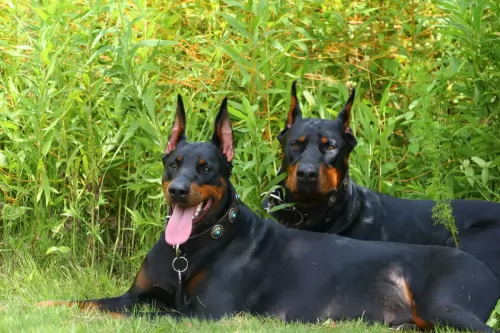 Dobers are mostly come in black, blue, red or fawn. Dobers are low maintenance for grooming. They were clean dogs because they never make a strong dog odor. Using brush in dobers hair for once per week reduces hair fall control. Dobers are not requiring frequent bathing most of the owners are getting bath for 3 or 4 times per year in grooming.
Dobers are mostly come in black, blue, red or fawn. Dobers are low maintenance for grooming. They were clean dogs because they never make a strong dog odor. Using brush in dobers hair for once per week reduces hair fall control. Dobers are not requiring frequent bathing most of the owners are getting bath for 3 or 4 times per year in grooming.
You can feed your puppy 2-3 small meals per day until it was 4 months old. And then have to decrease one meal and two for a day. And often you should not keep food and leave food sitting out all the time. Then after six months needs to stop feeding much vitamins and minerals because it leads a several health problems in his muscle and joints.
This type of dogs should not be tied up alone outside, because it should be manifest itself by barking chewing. The people who are working for a long time should not be adopting this type of dogs. Naturally dobers are well protective to our home and people. At the same time small children must be supervised. At the same time if we are not strict, dobers would be get out of our hand.
 For his size, you’d be inclined to think that the Danish Broholmer will require a lot of exercise, but in fact he is much like any other other. He will love to join you on your daily walks and will readily run to fetch a ball.
For his size, you’d be inclined to think that the Danish Broholmer will require a lot of exercise, but in fact he is much like any other other. He will love to join you on your daily walks and will readily run to fetch a ball.
Your Danish Broholmer will require quality food manufactured exclusively for large dog breeds.
There are excellent manufactured dog foods out there and you can take the kibble and mix in some home-made foods from time to time such as cooked brown rice, vegetables and chicken. He will also require some raw meat added into the diet occasionally.
Never leave him without a constant supply of cool, fresh water.